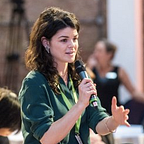Why we use Edge to generate ideas
One of the other unusual features of Entrepreneur First, alongside selecting individuals without a cofounder, is that you don’t need an idea to join us. Some people do join us with one, but this isn’t a requirement.
When we first founded EF in 2011, we were told it was crazy to work with people who don’t have a fully formed idea. We believe this is short sighted. In the same way you can learn about each stage of the startup process, you can learn how to develop ideas.
From our experience, we know that the ideas that are most valuable, and the most likelihood of successful funding, are those that are derived from a founder’s Edge.
An individual’s Edge is their unfair advantage in solving a problem, compared to other founders.
You can read more about Edge here.
Here are three reasons to help you understand our emphasis on Edge, and why Edge-based ideation is so important:
Edge gives you a head start against competitors.
The average lifespan of a company is rapidly reducing. Yale professor Richard Foster found that the average lifespan of a company listed in the US has decreased by more than 50 years in the last century to just fifteen years. For tech startups, this boom and bust is even more apparent. We have all seen companies heralded as the next unicorn crash and burn overnight.
At EF we want to help you build enduring businesses that create long term value for customers, founders and investors. To make this happen, you need to ensure a level of defensibility in your startup, even at the earliest stage of ideation.
Your Edge is your personal competitive advantage against other founders. By leveraging your technical expertise, or by using your domain expertise, you are ensuring you have a deep understanding of the problem you’re solving and setting yourself apart from other founders.
Edge gives you a head start as a founder.
Founding a company is one of the hardest career paths you can take. Being a founder is a steep learning curve throughout your company’s development. As a founder you will need to learn a multitude of new skills (fundraising, management, negotiation, sales etc) and also new knowledge (what is good value for office space? What are drag along rights? Which is the best investor for your startup? etc). Founders will tell you this learning curve continues throughout their company’s development, from a two person startup all the way through to a 2,000 person unicorn. It’s a challenge, but for the smart and ambitious, it’s also what makes founding a company so addictive.
By working on an idea where you already have the skills, knowledge or network for can fast track your startup’s development; you are giving yourself a headstart. If you know how to build it, if you know how to work the procurement process, or if you have the contacts to sell the product to, it makes sense to use those assets to your advantage.
Sometimes knowing too much about an industry can put you off developing an idea in that space — you know why it’s going to be hard to bring your idea to life. This is why many first time founders choose to work on unfamiliar technology or in unfamiliar industries. They don’t know what they don’t know. By choosing to work on your edge you’re able to use your existing knowledge and skills and give yourself a head start.
Edge allows you to work on something you care about.
The company you found could be a ten year endeavour to get to exit. It’s a hard journey and motivation can wane as your life and priorities change. Having a deep seated desire to bring a technology to the masses, or to solve a big problem can be what keeps you going when you’re in the trough of sorrow.
The common thread is a focus on the long term. Quick wins for start ups are rarer than unicorns so be prepared for the long haul. You can read more about our thoughts on quick exits here.
If you’d like to develop your idea with EF, you can find out more and apply here www.joinef.com
Alice Bentinck is Co-Founder of Entrepreneur First (EF.) EF runs full-time programmes that fund the most talented scientists, engineers, developers and industry experts to find a co-founder, then helps those teams grow their businesses and raise funding. We’ve built >100 companies worth >$1B so far.
We currently run programmes in Berlin, Singapore and London, you can apply here or sign up below to get advice from the EF team on your startup journey.
